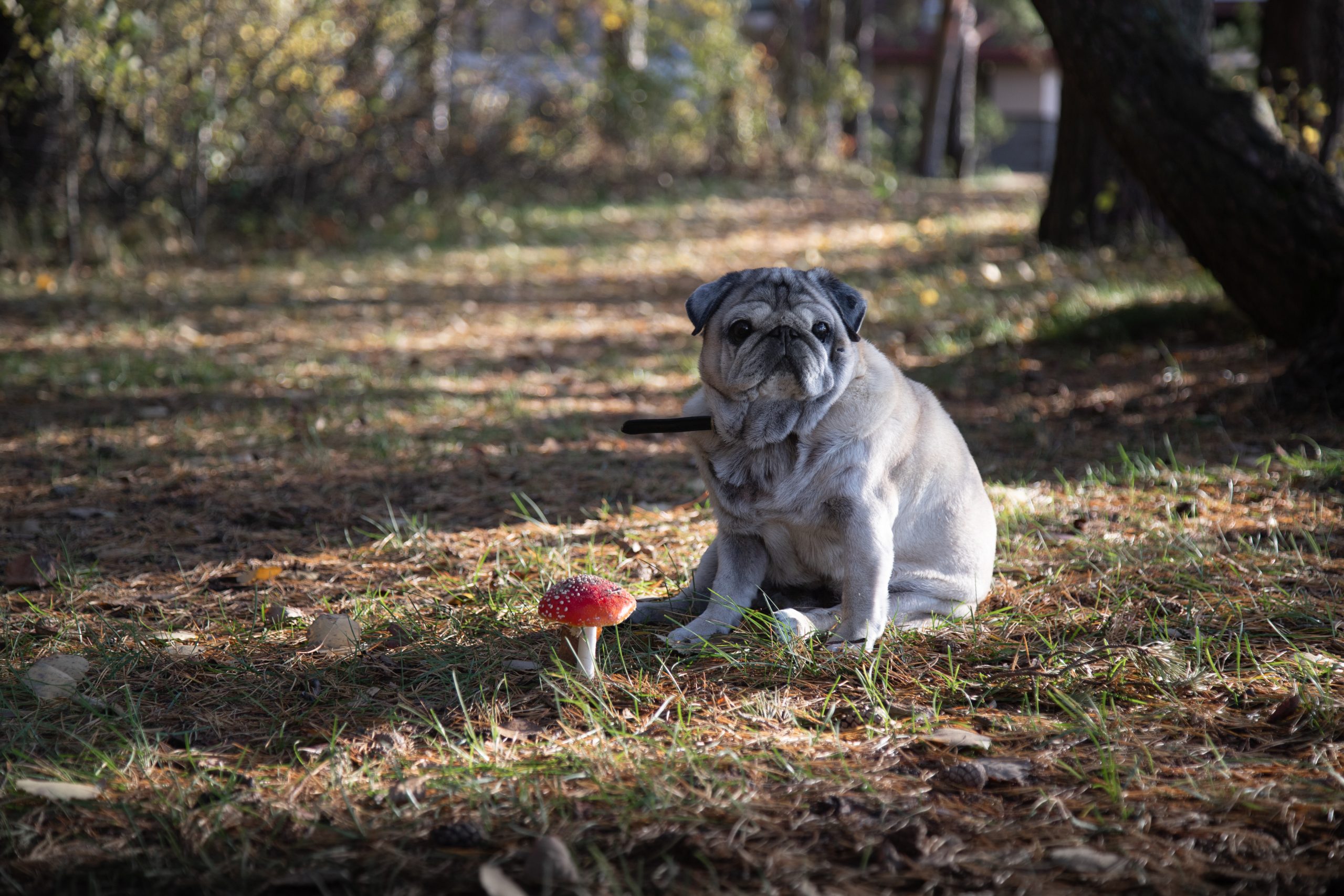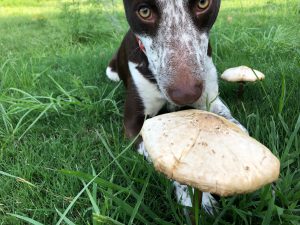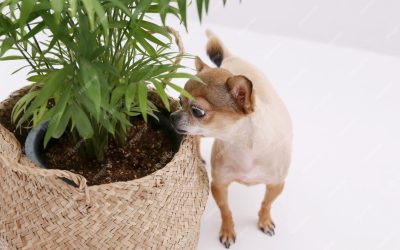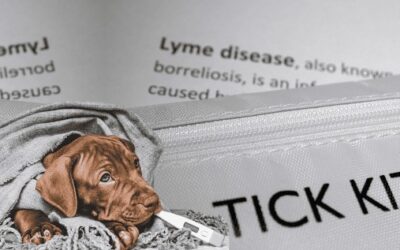Can Dogs Eat Mushrooms? What You Need to Know

Mushrooms have long intrigued and concerned dog owners alike. These fascinating fungi, available in countless varieties, can be both a delicious treat and a serious hazard for our canine companions. Understanding the relationship between dogs and mushrooms is crucial, as not all mushrooms pose the same level of risk.
This guide covers everything you need to know, from identifying safe mushrooms to recognizing the dangers of wild varieties and what to do if your dog eats a mushroom they shouldn’t have.
Are All Mushrooms Dangerous for Dogs?
Not necessarily! But caution is key. Mushrooms can generally be grouped into three categories when it comes to dogs:
- Safe and edible mushrooms – These are store-bought varieties that dogs can eat in moderation.
- Mildly toxic mushrooms – These may cause minor digestive upset.
- Severely toxic mushrooms – These can be life-threatening if ingested.
Even with safe mushrooms, each dog may react differently. Some pups have sensitive stomachs, so it’s best to introduce any new food slowly and watch for any signs of discomfort.
Mushrooms That Are Safe for Dogs
If you want to share mushrooms with your furry friend, stick to these varieties:
- White Button Mushrooms – Found in most grocery stores, these are rich in B vitamins and minerals.
- Portobello Mushrooms – A larger version of button mushrooms, packed with antioxidants and fiber.
- Shiitake Mushrooms – Known for immune-boosting properties, but should always be cooked first.
- Maitake Mushrooms – Also called “hen of the woods,” they may have anti-inflammatory benefits.
- Reishi Mushrooms – Often found in supplement form for their potential health benefits.
Always serve mushrooms plain, cooked, and without seasoning, oils, or additives. Raw mushrooms can be tough on a dog’s digestive system.
Wild Mushrooms: A Serious Threat
Wild mushrooms are where things get dangerous. Even experienced foragers struggle to differentiate between safe and toxic varieties, making it nearly impossible for the average pet owner to judge.
Some of the most toxic mushrooms for dogs include:
- Amanita species – Death cap and destroying angel mushrooms are among the deadliest.
- Galerina species – These can cause severe liver damage.
- Inocybe species – Contain toxins that affect the nervous system.
- Clitocybe dealbata – Known for causing severe poisoning symptoms.
Mushroom poisoning is more likely in damp weather when fungi grow quickly. Always keep an eye on your pup during walks and teach them the “leave it” command to prevent accidents.
Signs of Mushroom Poisoning in Dogs
Early detection is critical. Symptoms of mushroom poisoning can vary but often include:
- Digestive Issues – Vomiting, diarrhea, and loss of appetite.
- Neurological Symptoms – Weakness, tremors, or seizures.
- Liver/Kidney Failure – Jaundice, increased thirst, and lethargy.
- Hallucinations – Disorientation and unusual behavior.
As Veronica Higgs, DVM stated in the PetMd article: “Clinical signs of mushroom poisoning in dogs may affect pets quickly (within 15-30 minutes after ingestion), but they can also be delayed up to 24 hours. It may take 2-3 days to see evidence of liver and kidney failure.”
How Vets Treat Mushroom Poisoning?
Veronica Higgs, DVM wrote in the same PetMd article: “If your pet ate mushrooms within the past two hours, your veterinarian may induce vomiting at the hospital as a means of decontamination. If your dog is already showing clinical signs, it may be too late to induce vomiting, as there is a risk of aspiration pneumonia. The vet may also give your dog activated charcoal to bind any additional toxin in the stomach.
Unfortunately, there is no specific antidote for mushroom poisoning in dogs. Treatment varies depending on the type and amount of mushroom ingested. Some dogs may be treated outpatient, with symptomatic care for vomiting and diarrhea. However, if the mushroom cannot be identified or is identified as highly toxic, your dog will need to be hospitalized and started on IV fluids for hydration and supportive care. Generally, therapy will be started to try to prevent signs from developing, even if the dog is not showing any immediate signs of illness.”
Preventing Mushroom Poisoning in Dogs
The best way to protect your dog is through prevention:
- Check your yard regularly and remove any mushrooms.
- Supervise outdoor time, especially in wooded areas.
- Teach the “leave it” command to stop your dog from eating unknown objects.
- Use a basket muzzle if your dog is prone to scavenging.
- Store mushrooms safely—don’t leave them within your dog’s reach.
Are Store-Bought Mushrooms Safe?
Most grocery store mushrooms are safe for dogs when cooked and unseasoned. However, avoid:
- Raw mushrooms – Hard to digest.
- Mushrooms cooked with garlic or onions – These ingredients are toxic to dogs.
- Large quantities – Even safe mushrooms should be given in moderation.
If you’re considering mushroom supplements, check with your vet first.
When to Call the Vet: What to Do If Your Dog Eats a Wild Mushroom
Spending time outdoors with your dog can be a joyful part of daily life, but it’s also important to be aware of potential hazards that might be lurking in your backyard or on your favorite walking trail. One such risk? Wild mushrooms. While some may be harmless, others can be extremely toxic to dogs. Knowing what to watch for—and when to act—can make all the difference.
Trust Your Instincts and Act Quickly
If you think your dog may have eaten a wild mushroom, it’s always better to play it safe and call your veterinarian right away. Even if your dog seems fine at first, some symptoms can take hours to appear, and early treatment can prevent more serious issues.
Watch for Signs of Illness
Symptoms such as vomiting, drooling, unsteadiness, or unusual tiredness can be signs that something’s wrong. If you notice any of these changes, don’t wait—reach out to your vet as soon as possible for guidance.
When It’s an Emergency
In more serious cases, toxic mushrooms can cause neurological problems or even affect vital organs. If your dog begins having seizures, shows signs of confusion, or seems severely ill, seek emergency care immediately.
Not Sure What They Ate? Call Anyway
Because it’s hard to tell which mushrooms are dangerous and which are not, it’s best not to take any chances. If you’re uncertain, your veterinarian can help assess the situation and recommend the next steps.
A quick phone call could be the key to keeping your pup safe and healthy. When it comes to potential mushroom ingestion, timely action is one of the most important things you can do for your furry friend.
How Can Pet Insurance Help You if Your Dog Needs Treatment?
Pet insurance can be a valuable tool in managing the costs of treating a dog’s veterinary expenses. By having a pet insurance policy in place, you can have peace of mind knowing that you can provide medical care for your furry companion without worrying about the financial burden. Pet insurance can help cover the costs of veterinary consultations, diagnostic tests, medications, and even specialized treatments if required.
Reimbursement
This method is the most common for pet insurance companies. You pay out of pocket for the veterinarian bill, and then the insurance company reimburses you for what’s covered under the insurance plan. The steps look like this.
- You pay the vet bill after your dog’s visit.
- You fill out the pet insurance claim form.
- Submit the claim form and other required documentation to the insurer.
- After the claim is approved, you will be reimbursed for eligible expenses.
What Does Odie Pet Insurance Cover?
Pet insurance covers various veterinary expenses, providing financial protection and peace of mind for pet owners. Here are the details of the coverage options offered by Odie Pet Insurance:
Illness & Injury Plan
The Illness & Injury Plan is an all-inclusive insurance plan designed to cover a wide range of medical needs for your pet. This plan includes comprehensive coverage for various illnesses, injuries, and veterinary services. Some of the covered items include:
- Veterinary exams and consultations
- Diagnostics (e.g., X-rays, lab tests)
- Prescribed medications
- Surgeries and hospitalization
- Rehabilitation, acupuncture, or chiropractic treatments
- Medically necessary supplies
- Euthanasia and cremation
The Wellness Plan
The Wellness Plan is a monthly membership that focuses on preventive care and covers routine veterinary services.
- Provides reimbursements for routine care items such as wellness visits (exams and vaccines), testing and parasite prevention, dental cleanings and at-home dental care, vitamins, supplements, and more.
- Through Odie’s partnership with Petivity, a leader in smart pet products and proactive care, Wellness Plan members can also receive reimbursements for Petivity devices and health kits, as well as eligible Purina food and supplements.
- Total reimbursement up to $700 per year.




